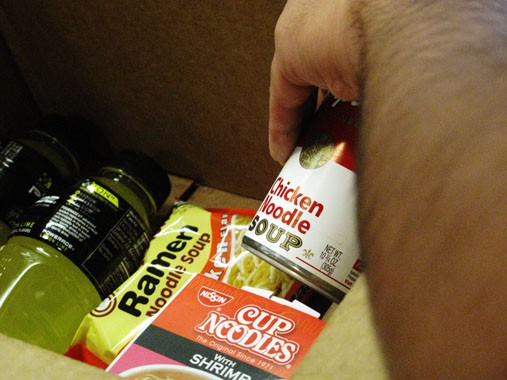Students sick with the flu and living on campus can now have some comfort food without having to leave their bed.
Flu care kits that contain items to hydrate and nourish sick students are now available for order by fax or over the phone. The kits can be delivered to students living in residence halls within three hours of ordering during normal hall hours. Students can also purchase the kits at Highland Market, which is open 24 hours a day, seven days a week, according to the Student Affairs Web site.
The student unions, Campus Health, Residence Life and some fraternities and sororities helped brainstorm and implement this project, said Kris Kreutz, director of administrative services for Campus Health Services.
“”I think it’s principally to help students who don’t feel well, who don’t feel like traveling around getting a series of things to make them feel better,”” he said.
Sick students can place a customized order for their flu kit. Choices include Cup Noodles, saltine crackers, macaroni and cheese, chicken noodle soup, chamomile tea, Sprite, Dasani water and Gatorade, according to the Student Affairs Web site. Disposable thermometers and hand sanitizer are also available. Prices vary depending on the quantity and selection of items requested, but delivery service is free for all orders.
“”This is a way to make sure they are hydrated and have some sort of calories going in to keep their system in order to fight the flu,”” Kreutz said.
Last week, five flu care kits were ordered during daytime hours, according to Kristi Van Os, a senior office specialist for dining services. Parents of sick students placed most of those orders.
“”These kids, when they get sick they get confined to their room and they can’t leave,”” she said. “”We’re just trying to take a proactive approach to it.””
Kreutz said that students living in close proximity to one another, whether in dorms, greek housing or in off campus student housing are more at risk of contracting the flu.
“”You’re not always symptomatic when you’re contagious,”” he said. Kreutz said the distance to stay away from someone who is sick is six feet.
With the combination of H1N1 flu and the seasonal flu, the flu season is especially active this year, according to Kreutz.
“”It seemed like a perfect time to think a little outside the box to be more responsive to students,”” he said. “”As long as there’s a need and as long as students continue to want (the flu kits) we’ll continue to work together collectively to provide (them),”” he said.









